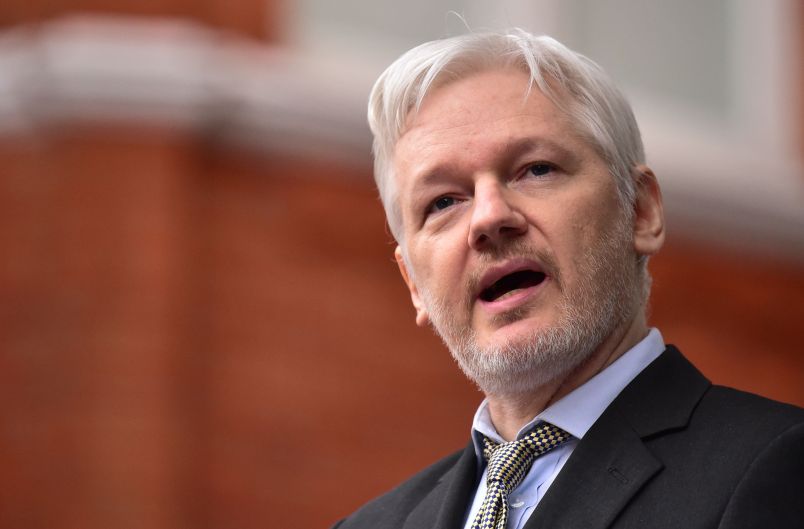WASHINGTON (AP) — WikiLeaks founder Julian Assange on Monday denounced last week’s U.S. intelligence report on Russian hacking, calling it a politically motivated “press release” that provided no evidence that Russian actors gave WikiLeaks hacked material.
In an online news conference, Assange said the report is vague and that U.S. intelligence officials should be embarrassed by the 25-page, declassified document. “This is a press release,” Assange said. “It is clearly designed for political effects.”
The report accuses Russia of trying to interfere with the U.S. political process, with actions that included hacking into the email accounts of the Democratic National Committee and individual Democrats like Hillary Clinton’s campaign chairman John Podesta. The report said Russia also used state-funded propaganda and paid “trolls” to make nasty comments on social media services, although there was no suggestion that Russia affected the actual vote count.
The report, for the first time, explicitly tied Russia President Vladimir Putin to the hackings. It called Russian activities the “boldest effort yet” to influence a U.S. election, and said the Russian government provided emails to WikiLeaks — something Assange denied again on Monday. The report said Russian intelligence agencies gave stolen DNC emails to WikiLeaks, which then released them to the public.
“As we have already stated, WikiLeaks’ sources with relation to the John Podesta and DNC leaks are not state parties,” Assange said. “They do not come from the Russian government.”
He did not provide any clues about the source of the documents, so it was unclear whether they could have been provided to WikiLeaks from Russian proxies.
The report lacked details about how the U.S. learned what it says it knows, such as any intercepted conversations or electronic messages from Russian leaders, including Putin, or about specific hacker techniques or digital tools the U.S. may have traced back to Russia in its investigations. A still-classified version of the report was shared late last week with President Barack Obama, Trump and top lawmakers in Congress.
In Moscow on Monday, Putin’s spokesman Dmitry Peskov told reporters that the Kremlin still believes that the accusations made in the report have no substance.
“They are amateurish and are hardly worthy of the high professional standards of top intelligence agencies,” he said. “We categorically rule out the possibility that Russian officials or official bodies could have been involved. We are tired of such accusations. This is beginning to remind us of a full-fledged witch hunt.”
Margarita Simonyan, the editor of the government-funded satellite TV channel RT that is frequently mentioned in the U.S. report, said in a weekend blog post: “Dear CIA: You get a total F for this thing you wrote.”
“You don’t cover the subject sufficiently, the sources are unnamed, out of date or simply incorrect, and it is written like a school homework assignment.”
Copyright 2017 The Associated Press. All rights reserved. This material may not be published, broadcast, rewritten or redistributed.







This guy is a fucking rapist. Like we should believe anything he says. I don’t think so. If he’s so innocent, why is he hiding out in an embassy instead of making his case? Fuck this guy!
Megalomaniacs all tend to think alike.
I agree, but this sort of he said/she said badinage is far less important than this frightening report that I had to find on Gizmodo. Our mainstream press has degenerated into gossip mags operated by phalanxes of inane Hedda Hopper impersonators.
Trump Just Dismissed the People in Charge of Maintaining Our Nuclear Arsenal
Whoa-fucking-nelly. You should email that to Josh Marshall. It should be front page news. We are soooooo fucked. I’m reaching my fill today. Don’t know if I can handle any more depressing news. I feel my inner-child is screaming in pain. There aren’t enough canned goods in the world that are gonna help see me through the nuclear winter we all might have to brace for. Trump is sooo ignorant, short-sighted and shallow.
I have to walk the dog and get some brisk air to clear out my head. Thanks for sharing that…I think?
So hidey man says they didn’t get the emails from Russia then prove it. If you don’t have the ability to cite your sources hidey man then you’re promulgating lies.